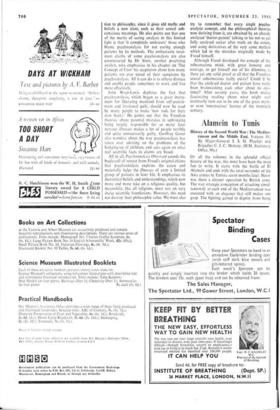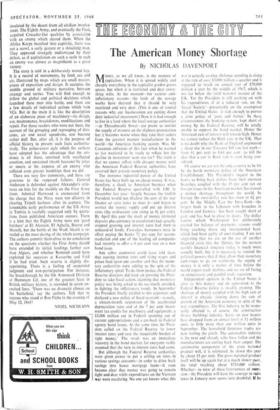Alamein to Tunis
History of the Second World War : The Mediter- ranean and the Middle East. Volume IV. By Major-General I. S. 0. Playfair and Brigadier C. J. C. Molony. (H.M. Stationery Office, 90s.)
OF all the volumes in the splendid official history of the war, this must have been the most fun to write. It starts with the battle of El Alamein and ends with the total surrender of the Axis armies in Tunisia seven months later. Never was there a cleaner operation by British arms. The vast strategic conception of attacking simul- taneously at each end of the Mediterranean was executed with an elegance that still makes one gasp. The fighting gained in dignity from being
insulated by the desert from all civilian involve- ment. The Eighth Army, and eventually the First, acquired Crusader-like qualities by association with an enemy which shared them. When the Afrika Korps marched into captivity, there was not a scowl, a surly gesture or a slouching man.
They appeared strangely undismayed by their defeat, as if capitulation on such a scale to such an enemy was almost as magnificent as a great victory.
The story is told in a deliberately muted key. It is a record of movements, by land, sea and air, illustrated by maps which are small master- pieces of exposition and design. It occupies the middle ground of military narrative, between strategy and tactics. You will find enough to follow the global and political decisions which launched these men into battle, and there are a few details of individual actions which won VCs. But in the main it is like the description of an elaborate piece of machinery—its design, use, maintenance, breakdowns, modifications and repair. For those readers who were not there, the account of the grouping and regrouping of divi- sions, air and naval squadrons, can become rather dull. But, after all, it is the purpose of official history to present such facts authorita- tively. The police-court style which the authors have adopted has the advantage that the evi- dence is all there, unmixed with recollected
emotion, and unstained• (thank heavens) by jokes or sneers at the expense of _an enemy who suffered even greater hardships than we did.
There are very few comments, and these are generous to the supposed failures. General Anderson is defended against Alexander's stric- tures on him for the muddle on the First Army front. Admiral Harwood is exonerated from the charge that the Navy were too dilatory in clearing Tripoli harbour after its capture. The lamentable early performance of the US Army in Tunisia is tactfully suggested only by quota- tions from published American sources. There is a hint that the Eighth Army were not 'good finishers' at El Alamein, El Agheila, Buerat and Mareth, but the battle of the Wadi Akarit is re- vealed as the most daring of the whole campaign. The authors commit themselves to no conclusion on the questions whether the First Army should have extended its initial landings farther east than Algiers, and whether Rommel could have exploited his successes at Kasserine and Faid if he had tried. Such reserve is slightly dis- appointing. There is a feeling of suspended judgment and non-participation. For instance, the breakthrough by the 6th Armoured Division at Hammam Lif, one of the greatest feats in British military history, is recorded in seven un- excited lines. 'There was no dramatic climax on the battlefield,' say the authors. Tell that to anyone who stood at Bou Ficha in the evening of May 12, 1943!
NIGEL NICOLSON















































 Previous page
Previous page